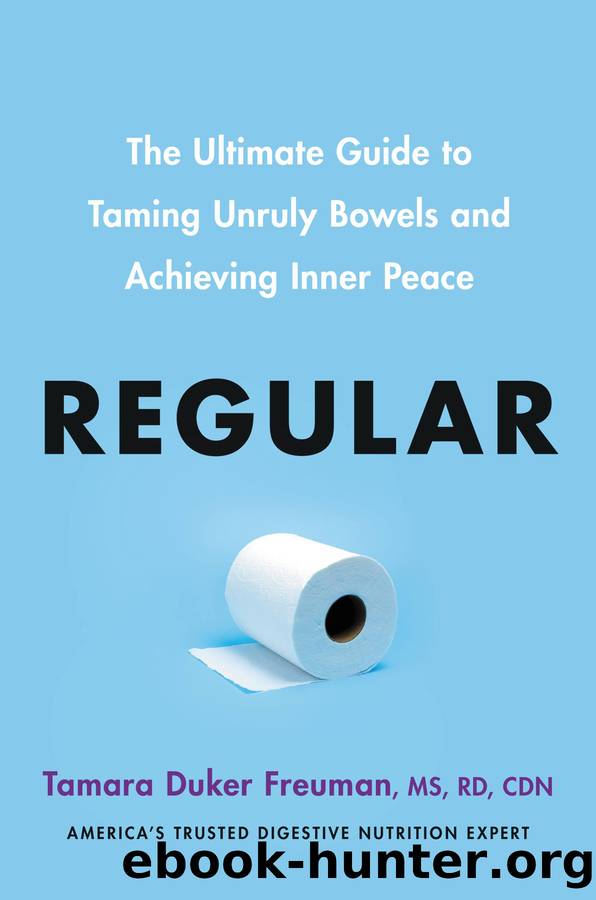Regular by Tamara Duker Freuman

Author:Tamara Duker Freuman [Duker, Tamara Freuman]
Language: eng
Format: epub
Publisher: Hachette Books
Published: 2023-04-11T00:00:00+00:00
Partial Enteral Nutrition
If drinking nothing but meal replacement shakes for two to three months feels like a way greater commitment than you have the emotional reserve to undertake, research is underway regarding partial enteral nutrition (PEN), in which you replace someâbut not allâof your solid meals with liquid meal replacements. A study published in 2015 combined data from a bunch of smaller studies of patients with moderate to severe Crohnâs disease who were taking the medication infliximab (Remicade) and found that people who combined the medication with a diet protocol in which they adhered to PEN were twice as likely to achieve disease remission compared with those who were only taking the medication without PEN, and close to three times more likely to remain in remission a year later. The effective regimen of PEN involved participants getting at least 600 of their daily calories from liquid formulas instead of solid food, and most (but not all) of these formulas were elemental formulas in which the nutrients were broken down by enzymes to be quickly and easily digestible. More research is needed, however, to offer more precise guidelines for those of us in clinical practice so we can offer individualized advice to our patients. In the absence of this research, however, it would not be unreasonable for well-nourished patients to work with a dietitian on replacing one or two of your three meals (or a meal and a snack) per day with a nutritionally balanced liquid meal for a period of time, especially if the solid meal(s) you eat are part of one of the anti-inflammatory diet patterns described later in this chapter.
As the above study on PEN demonstrates, while there isnât yet a strong case to be made for diet alone being able to induce remission in IBD on its own for most adults, there is far more compelling evidence that points to diet functioning in a âbest supporting actorâ role, essentially enhancing the effectiveness of medical treatments; helping to speed up the achievement of remission compared with just taking medicine alone; and helping patients who are in remission reduce the likelihood of a flare-up. Itâs been quite some time since Iâve heard of a doctor telling their patients with IBD that diet doesnât matter at all, as there is increasing recognition in the medical community that our food choices affect the gut microbiota, and in turn, the gut microbiota interact with our immune system in a way that can influence inflammation.
The International Organization for the Study of Inflammatory Bowel Disease (IOIBD) has issued diet recommendations based on the best available research we have about the connection between eating patterns and IBD disease risk and outcomes. They offer some general guidelines about ingredients and foods to avoid, as well as some specific guidelines for foods to emphasize and eat more of, depending on what type of IBD you have.
According to 2020 guidelines published by the IOIBD, it is prudent for people with IBD to try minimizing their intake of ultra-processed
Download
This site does not store any files on its server. We only index and link to content provided by other sites. Please contact the content providers to delete copyright contents if any and email us, we'll remove relevant links or contents immediately.
| Administration & Medicine Economics | Allied Health Professions |
| Basic Sciences | Dentistry |
| History | Medical Informatics |
| Medicine | Nursing |
| Pharmacology | Psychology |
| Research | Veterinary Medicine |
Periodization Training for Sports by Tudor Bompa(8273)
Why We Sleep: Unlocking the Power of Sleep and Dreams by Matthew Walker(6725)
Paper Towns by Green John(5191)
The Immortal Life of Henrietta Lacks by Rebecca Skloot(4588)
The Sports Rules Book by Human Kinetics(4387)
Dynamic Alignment Through Imagery by Eric Franklin(4217)
ACSM's Complete Guide to Fitness & Health by ACSM(4060)
Kaplan MCAT Organic Chemistry Review: Created for MCAT 2015 (Kaplan Test Prep) by Kaplan(4012)
Livewired by David Eagleman(3774)
Introduction to Kinesiology by Shirl J. Hoffman(3772)
The Death of the Heart by Elizabeth Bowen(3622)
The River of Consciousness by Oliver Sacks(3604)
Alchemy and Alchemists by C. J. S. Thompson(3522)
Bad Pharma by Ben Goldacre(3428)
Descartes' Error by Antonio Damasio(3279)
The Emperor of All Maladies: A Biography of Cancer by Siddhartha Mukherjee(3163)
The Gene: An Intimate History by Siddhartha Mukherjee(3098)
The Fate of Rome: Climate, Disease, and the End of an Empire (The Princeton History of the Ancient World) by Kyle Harper(3067)
Kaplan MCAT Behavioral Sciences Review: Created for MCAT 2015 (Kaplan Test Prep) by Kaplan(2986)
